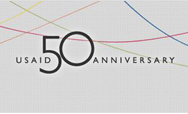HIV/AIDS Research
Key Priorities | Issue Briefs and Technical Resources
 |
| Source: Lydia Martin/Courtesy of Photoshare |
HIV infection rates continue to rise in many developing countries. An estimated 2.5 million new infections occur every year, and no cure is available. Infected persons worldwide number nearly 33 million. In sub-Saharan Africa, almost 60 percent of infected individuals are women. Current strategies for preventing HIV infection, including delay of sexual debut, partner reduction, and use of condoms, are not possible for many women in developing countries. Novel technologies to prevent new HIV infections are needed to complement current effective methods of HIV prevention. All existing and developing HIV/AIDS prevention approaches must be tailored for different disease situations and target populations.
Areas of Research and Introduction
Since 2001, responding to congressional directives, USAID, now through the U.S. President’s Emergency Plan for AIDS Relief (PEPFAR), has funded the International AIDS Vaccine Initiative (IAVI), a nonprofit organization that acts as a virtual pharmaceutical company to accelerate the development and clinical testing of HIV vaccine candidates. IAVI facilitates collaboration among university, government, and private-sector groups to ensure that the appropriate resources are available for each phase of product development.
USAID support of microbicide research has led to the development of several potential products, some of which are in the final stages of international clinical trials to evaluate safety, effectiveness, and acceptability in preventing or decreasing HIV transmission. USAID supports targeted activities to ensure that after testing is completed, introduction and distribution of microbicides will be expedited in the developing country populations where the need is greatest.
USAID supports applied research and public health evaluations to provide local implementing partners, donors, and national governments with the evidence base to improve HIV/AIDS services and inform policy. Specifically, projects are undertaken to facilitate improved solutions to HIV/AIDS service delivery issues, improve utilization of applied research results, improve capacity of developing country organizations to conduct applied HIV/AIDS research and use research results, and to bring new and improved HIV/AIDS program models to developing countries.
Key Priorities
Vaccine Development
An effective AIDS vaccine will significantly advance a comprehensive prevention strategy. The search for this promising HIV prevention tool must be intensified despite the distinct challenge of developing and introducing such a product. Although scientific advances in defining how the human immune system may protect itself against HIV are unfolding, the hope for an effective vaccine remains elusive.
Microbicides
Current strategies for preventing HIV infection are not available to many women in developing countries. Microbicides are a new class of health products that would provide women with an effective chemical barrier to sexually transmitted HIV. USAID’s strategy to promote the development of microbicides is to focus support on the advanced testing of the most promising candidates available.
Applied Research and Public Health Evaluation
Through partners under the USAID Supporting Evaluation and Research to Combat HIV/AIDS (SEARCH) project, the Agency carries out HIV/AIDS program research and public health evaluations to improve coverage, quality, and effectiveness of HIV/AIDS programs in developing countries. The project also aims to strengthen local capacity in HIV/AIDS operations research and public health assessments through training and in-country collaborations.
USAID Issue Briefs |
|
Technical Resources |
|
|



